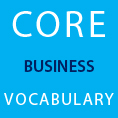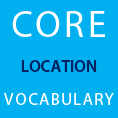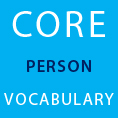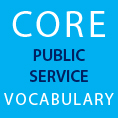- What are the Core Vocabularies
- Who is using the Core Vocabularies
- Read more about the Core Vocabularies
|
The Handbook for using the Core Vocabularies describes how the Core Vocabularies can be used by public administrations to attain a minimum level of semantic interoperability for e-Government systems. The Handbook explains how to (a) design new data models that extend the Core Vocabularies; and (b) map existing data models to the Core Vocabularies. A practical guide to using the Core Vocabularies, based on the handbook, is available on Joinup. |
What are the Core Vocabularies
Core Vocabularies are simplified, re-usable and extensible data models that capture the fundamental characteristics of an entity in a context-neutral fashion. Public administrations can use and extend the Core Vocabularies in the following contexts:
- Development of new systems: the Core Vocabularies can be used as a default starting point for designing the conceptual and logical data models in newly developed information systems.
- Information exchange between systems: the Core Vocabularies can become the basis of a context-specific data model used to exchange data among existing information systems.
- Data integration: the Core Vocabularies can be used to integrate data that comes from disparate data sources and create a data mesh-up.
- Open data publishing: the Core Vocabularies can be used as the foundation of a common export format for data in base registries like cadastres, business registers and public service portals.
SEMIC supported international working groups to forge consensus on the following Core Vocabularies.
|
Vocabulary |
Description |
|---|---|
|
The Core Business Vocabulary is a simplified, reusable and extensible data model that captures the fundamental characteristics of a legal entity, e.g. the legal name, the activity, address, legal identifier, company type, and its activities. On 8 January 2013, the RDF syntax of the Core Business Vocabulary has been formally published on the W3C standards track as a Public Working Draft. The RDF syntax binding of the Core Business Vocabulary has been named as Registered Organisation Vocabulary by W3C. The latest version of the Core Business Vocabulary can be downloaded here. |
|
|
The Core Location Vocabulary is a simplified, reusable and extensible data model that captures the fundamental characteristics of a location, represented as an address, a geographic name, or geometry. The Location Vocabulary is aligned with the INSPIRE data specifications. The latest version of the Core Location Vocabulary can be downloaded here. |
|
|
The Core Person Vocabulary is a simplified, reusable and extensible data model that captures the fundamental characteristics of a person, e.g. the name, the gender, the date of birth, etc. The latest version of the Core Person Vocabulary can be downloaded here. |
|
|
The Core Public Service Vocabulary is a simplified, reusable and extensible data model that captures the fundamental characteristics of a service offered by public administration. Such characteristics include the title, description, inputs, outputs, providers, locations, etc. of the public service. An application profile of the Core Public Service Vocabulary (CPSV-AP) has been developed for describing public services and grouping them in business events. The latest version of the CPSV-AP can be downloaded here. |
|
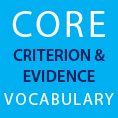
|
The Core Evidence and Criterion Vocabulary is a simplified, reusable and extensible data model for describing the principles and the means that a private entity must fulfil in order to become eligible or to be qualified to perform public services or participate in public procurement. Public entities often need to define the criteria. A Criterion is a rule or principle that is used to judge, evaluate or test something. An Evidence is the means by which a Criterion may be proven. The latest version of the Core Evidence and Criterion Vocabulary can be downloaded here. |
|
|
The Core Public Organisation Vocabulary is a simplified, reusable and extensible data model for describing public organisations in the European Union. The latest version of the Core Public Organisation Vocabulary can be downloaded here. |
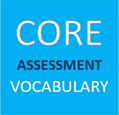
|
The Core Assessment Vocabulary represents and defines what an “Assessment” of “assets” is and how to perform the assessment based on “Criteria”. It is a domain-agnostic vocabulary, meaning that it can be used to assess any type of assets. The latest version of the Core Assessment Vocabulary can be downloaded here. |
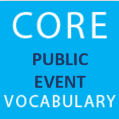
|
The Core Public Event Vocabulary is a simplified, reusable and extensible data model that captures the fundamental characteristics of a public event, e.g. the title, the date, the location, the organiser etc. The latest version of the Core Public Event Vocabulary can be downloaded here. |
| The CSSV is the vocabulary used for the information exchange related to standards and specifications amongst software solutions, and it is the key element for the development of the new release of the EIRA Library of Interoperability Specifications (ELIS). More information and the latest releases can be found here. |
Visit the Core Vocabularies page on Joinup for more information |
Mappings between the Core Vocabularies and other international data specifications are available at the Core Data Model Mapping Directory.
Read more about the Core Vocabularies here or view our introductory training.
Who is using the Core Vocabularies
The projects that are implementing the Core Vocabularies can be found at the SEMIC map.
Read more about the Core Vocabularies
|
Title |
Description |
|
Use of Crane’s Genericode-to-UBL-NDR to extend the Core Vocabularies and create e-Document formats (April 2014) |
This tutorial explains how to create an electronic Document in XSD format using the Genericode to UBL NDR tool of Cranesoftwrights. We have used the tool to create a sample document called ‘Business Activity Registration Request’ using the ISA Core Vocabularies and the UBL Naming and Design Rules. |
|
How to describe organizations with Core Business Vocabulary and ORG Ontology (November 2012) |
This case study explains how organisations can be described in RDF using the Core Business Vocabulary and the Organization Ontology. |
|
Interconnecting business registers with the Core Business Vocabulary (November 2012) |
The business case underscores the potential of the Core Business Vocabulary as the foundation for a common semantic standard for interconnecting business registers in Europe and beyond. |
|
Process and Methodology for Developing Core Vocabularies (November 2011) |
This report documents the process and methodology that is followed to assure that consensus on such a Core Vocabulary can be reached and that they receive the widest possible Member State participation during the development and later adoption. |
|
Towards Open Government Metadata (September 2011) |
This is a position paper on the promotion of Open Government Metadata as an important facilitator and enabler for semantic interoperability. |
|
SEMIC.eu Core Vocabularies: the Core Person Case (August 2011) |
This case study describes the initiatives of SEMIC.EU on creating Core Vocabularies for e-Government. |


